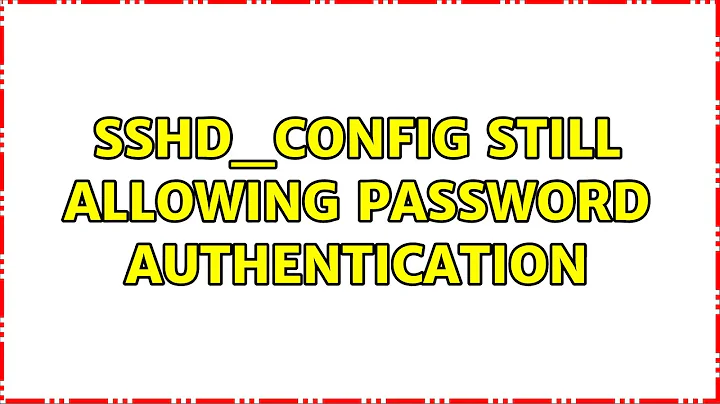Sshd_config still allowing password authentication
Solution 1
You need to do three things here:
(1) Set PermitRootLogin to be without-password or restrict-password or no. For security. I normally set it to no.
(2) You're missing something else that's pretty important. You should be using PAM for authentication for things - UsePAM yes is what the default usually is; this allows you to use UNIX user login data.
(3) Also important, NORMALLY you set ChallengeResponseAuthentication to no. This protects from bypassing the without-password restriction for root logon. (The exception is if you're using libpam-duo and the Duo Security 2FA system, in which case you need ChallengeResponseAuthentication set to yes, but this isn't a typical setup.)
Once you've done that, sudo service ssh restart to restart the SSH service with the new configuration. Attempt SSH from another window before you logout of your SSH session to make sure things are working as expected.
Solution 2
I followed Thomas' steps but still didn't work. Turns out I just needed to set UsePAM to no and it now disallows login without a public key.
Related videos on Youtube
Mattias De Charleroy
Updated on September 18, 2022Comments
-
Mattias De Charleroy over 1 year
I have adapted my sshd_config file where I changed the value of:
- PasswordAuthentication no
- ChallengeResponseAuthentication no
- usePAM no ( now set to yes)
Furthermore I have restarted the sshd service by executing:
sudo service ssh restart. I have also done a reboot.I am still allowed to login with a user password. Any idea what I have been missing?
# Package generated configuration file # See the sshd_config(5) manpage for details # What ports, IPs and protocols we listen for Port 22 # Use these options to restrict which interfaces/protocols sshd will bind to #ListenAddress :: #ListenAddress 0.0.0.0 Protocol 2 # HostKeys for protocol version 2 HostKey /etc/ssh/ssh_host_rsa_key HostKey /etc/ssh/ssh_host_dsa_key HostKey /etc/ssh/ssh_host_ecdsa_key #Privilege Separation is turned on for security UsePrivilegeSeparation yes # Lifetime and size of ephemeral version 1 server key KeyRegenerationInterval 3600 ServerKeyBits 768 # Logging SyslogFacility AUTH LogLevel INFO # Authentication: LoginGraceTime 120 PermitRootLogin yes StrictModes yes RSAAuthentication yes PubkeyAuthentication yes #AuthorizedKeysFile %h/.ssh/authorized_keys # Don't read the user's ~/.rhosts and ~/.shosts files IgnoreRhosts yes # For this to work you will also need host keys in /etc/ssh_known_hosts RhostsRSAAuthentication no # similar for protocol version 2 HostbasedAuthentication no # Uncomment if you don't trust ~/.ssh/known_hosts for RhostsRSAAuthentication #IgnoreUserKnownHosts yes # To enable empty passwords, change to yes (NOT RECOMMENDED) PermitEmptyPasswords no # Change to yes to enable challenge-response passwords (beware issues with # some PAM modules and threads) ChallengeResponseAuthentication no # Change to no to disable tunnelled clear text passwords PasswordAuthentication no # Kerberos options #KerberosAuthentication no #KerberosGetAFSToken no #KerberosOrLocalPasswd yes #KerberosTicketCleanup yes # GSSAPI options #GSSAPIAuthentication no #GSSAPICleanupCredentials yes X11Forwarding yes X11DisplayOffset 10 PrintMotd no PrintLastLog yes TCPKeepAlive yes #UseLogin no #MaxStartups 10:30:60 #Banner /etc/issue.net # Allow client to pass locale environment variables AcceptEnv LANG LC_* Subsystem sftp /usr/lib/openssh/sftp-server # Set this to 'yes' to enable PAM authentication, account processing, # and session processing. If this is enabled, PAM authentication will # be allowed through the ChallengeResponseAuthentication and # PasswordAuthentication. Depending on your PAM configuration, # PAM authentication via ChallengeResponseAuthentication may bypass # the setting of "PermitRootLogin without-password". # If you just want the PAM account and session checks to run without # PAM authentication, then enable this but set PasswordAuthentication # and ChallengeResponseAuthentication to 'no'. UsePAM noEDIT:
PermitRootLoginis now set tono.usePAMis now set toyes.
Still not working though.
-
Mattias De Charleroy almost 7 yearsPermitRootLogin is now set to no. UsePAM is now set to yes ChallengeResponseAuthentication is still set to no. I have restarted the service but still to no avail.




